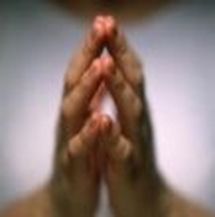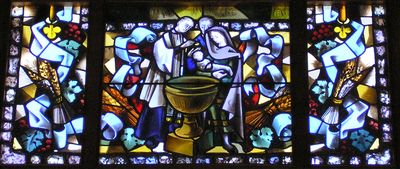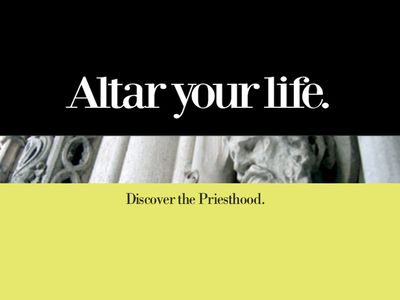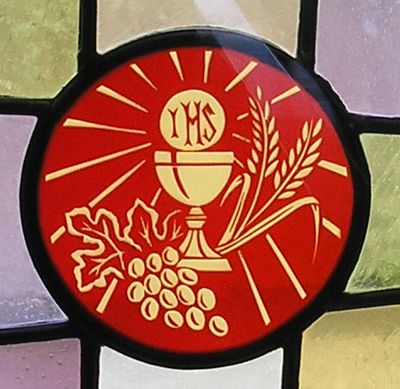 Each human being, created in the image and likeness of God, has a fundamental vocation as a member of the human family. Through the sacrament of Baptism, each person receives “a call” or vocation. All are called to holiness and to serve. This call can be lived out in a variety of ways – as a married or single person, or as a priest, brother or sister.
Each human being, created in the image and likeness of God, has a fundamental vocation as a member of the human family. Through the sacrament of Baptism, each person receives “a call” or vocation. All are called to holiness and to serve. This call can be lived out in a variety of ways – as a married or single person, or as a priest, brother or sister.
Mission
Everyone who is baptized is called to witness to the good news in the world, wherever they are. Some are called to go out to other parts of the world. If you want more information about missionary life and opportunities, contact the Vocation Director at the bottom of this page.
“Go therefore and make disciples of all nations, baptizing them in the name of the Father, the Son, and of the Holy Spirit, and teaching them to obey everything that I have commanded you.” (Matthew 28:19)
The Universal Call to Holiness
Through baptism, each member of the Church is called to holiness and to share in the mission of the Body of Christ. There has been a flourishing of lay ministry within the Church. Lay people are encouraged to nurture and use their gifts and talents for the sake of the Church and the world. Such lay ministry requires increased training in the faith, and in development of ministerial skills. To pursue this further you are encouraged to begin within your own parish and in discussion with your local priest of the Office for Pastoral Renewal & Family Ministry.
Religious Life
Since all the baptized share a common relationship with God, all are called to be “religious” or holy in the broad sense of the word. Some men and women, however, choose to live a particular lifestyle called religious life. These people join a community of people that follows a specific tradition or spirituality patterned after the life and teaching of the founder of that community. Many religious profess what is referred to as the Evangelical Vows: poverty, chastity and obedience. There are religious priests, brothers and sisters. For contact information for Religious Communities (women and men) serving within the Archdiocese of Armagh, please go to the Directory of the web site. For lists of web sites of various religious communities, go to the links section of www.vocationsireland.ie (Irish) or www.vocations.com (American).
 About the Priesthood
About the Priesthood
A diocesan priest can also be described as a parish priest, or one who works within and serves a particular parish within a diocese. Diocesan priests are very active people, with friends, hobbies and recreational activities, just like anybody else. It’s said that a diocesan priest “is someone who lives with the people and each becomes a part of the other’s life.” The role of a diocesan priest is to:
-
Serve the individuals and families within his parish
-
Be the spiritual leader of that community
-
Some diocesan priests serve the diocese in schools, as teachers or chaplains, in hospitals or in prisons.
Promises
A diocesan priest commits himself to a celibate life and to obedience to the bishop. Both celibacy and obedience are rooted in of Christ who offered Himself in loving service of the Father. Celibacy calls for a spirit of selflessness and is a sign of the ultimate call to union with God. Obedience fosters a willing surrender to the will of God in all circumstances.
More Than a Job
Deciding on a priestly vocation is, in one sense, a career choice like any other. Skills and attributes include:
-
Strong interpersonal abilities
-
Leadership
-
Charity towards others
-
Positive self-image
-
Good health
-
Emotional stability
But being a priest is more than a job – it’s a way of life, requiring strong personal and professional commitment that is reflected in all that you do – all that you are. A commitment to a daily life of personal prayer is at the heart of what it means to be a priest. There are many benefits and rewards in the priesthood. The opportunity to serve God and bring hope, joy and healing into the lives of many people brings with it a deep happiness and a sense of peace.
A Special Role  The Eucharist is the centre of a priest’s life and ministry. In addition to the celebration of the Holy Eucharist, a diocesan priest is ordained to:
The Eucharist is the centre of a priest’s life and ministry. In addition to the celebration of the Holy Eucharist, a diocesan priest is ordained to:
-
Offer pastoral service
-
Proclaim God’s word
-
Minister the Sacraments (the visible signs of God’s presence in the Christian community), e.g. celebrate baptism, witness marriages, bring comfort at funerals, and bring God’s healing presence to people through the Sacrament of Penance (Confession) and the Sacrament of the Sick.
-
Diocesan priests set aside some time each day for personal reflection and private prayer.
-
Visits to the sick and troubled, working on various parish projects and activities, and counseling for individuals, married couples or families are also part of his role.
Vocation Prayer
Lord, make us generous people, more considerate towards others, more honest with ourselves, more faithful to you. Help us all to find our true vocation in life, so that through it we may find happiness ourselves and bring happiness to others. Lord, grant those whom you call to priesthood religious life or diaconate, the generosity to answer your call so that those who seek your help may always find it. Amen.
Fr. Peter McAnenley
DIOCESAN VOCATIONS DIRECTOR
Parochial House, 42 Abbey Street, Armagh
Tel: 028 3752 2802
Please replace 028 with 048, if dialling from the Republic of Ireland
Members of ARMAGH Diocesan Vocations Team
Fr Peter McAnenly
Fr Pat Hannigan
Fr Charles McCann
Fr Emlyn McGinn
Mrs Teresa Lyttle
Mrs Bredge Casey
Mrs Kay McDonald
Mr Martin Fox
Mr Denis Bradley
RESOURCES


